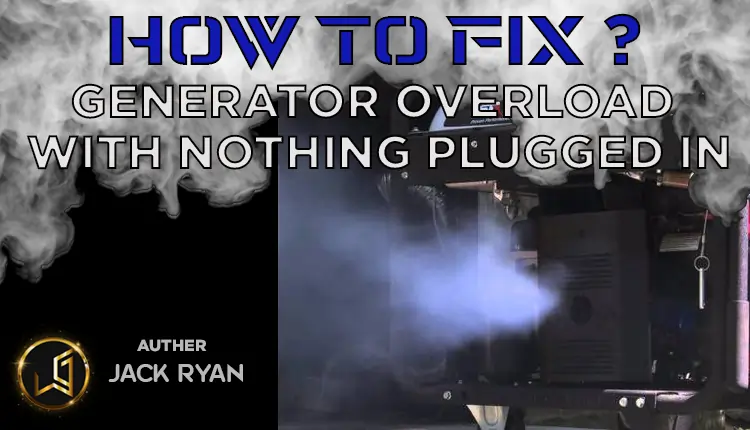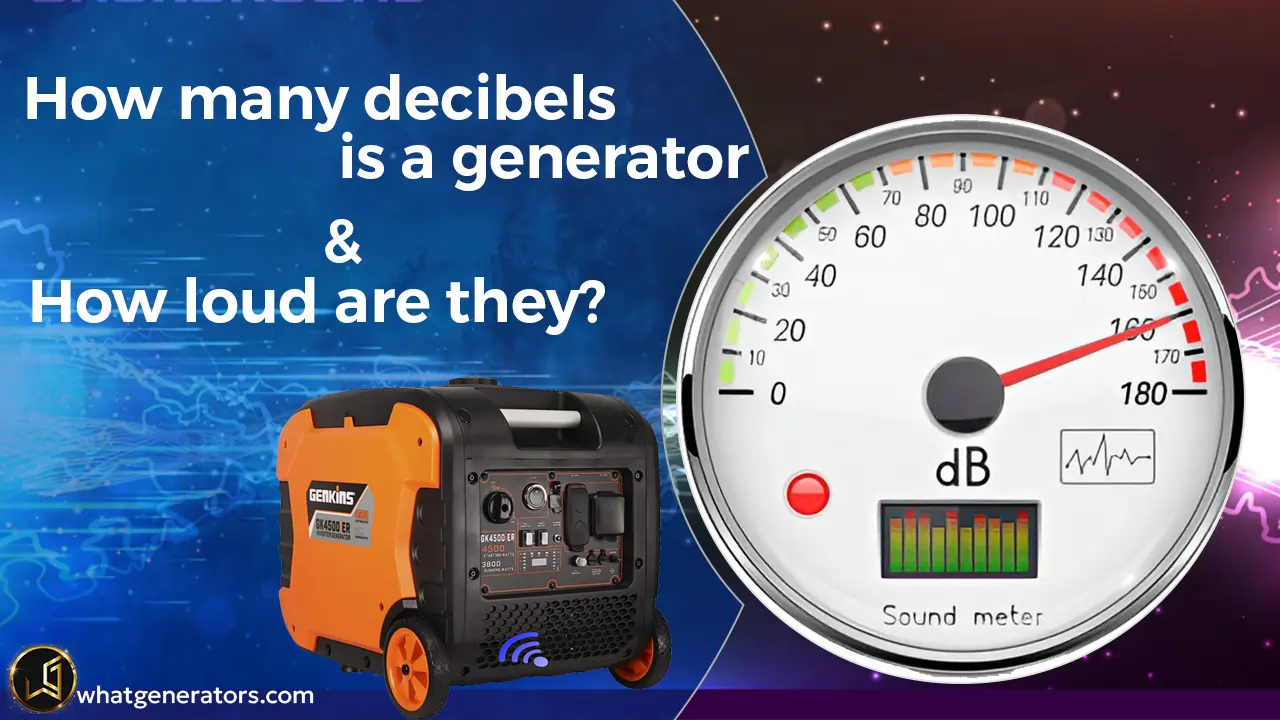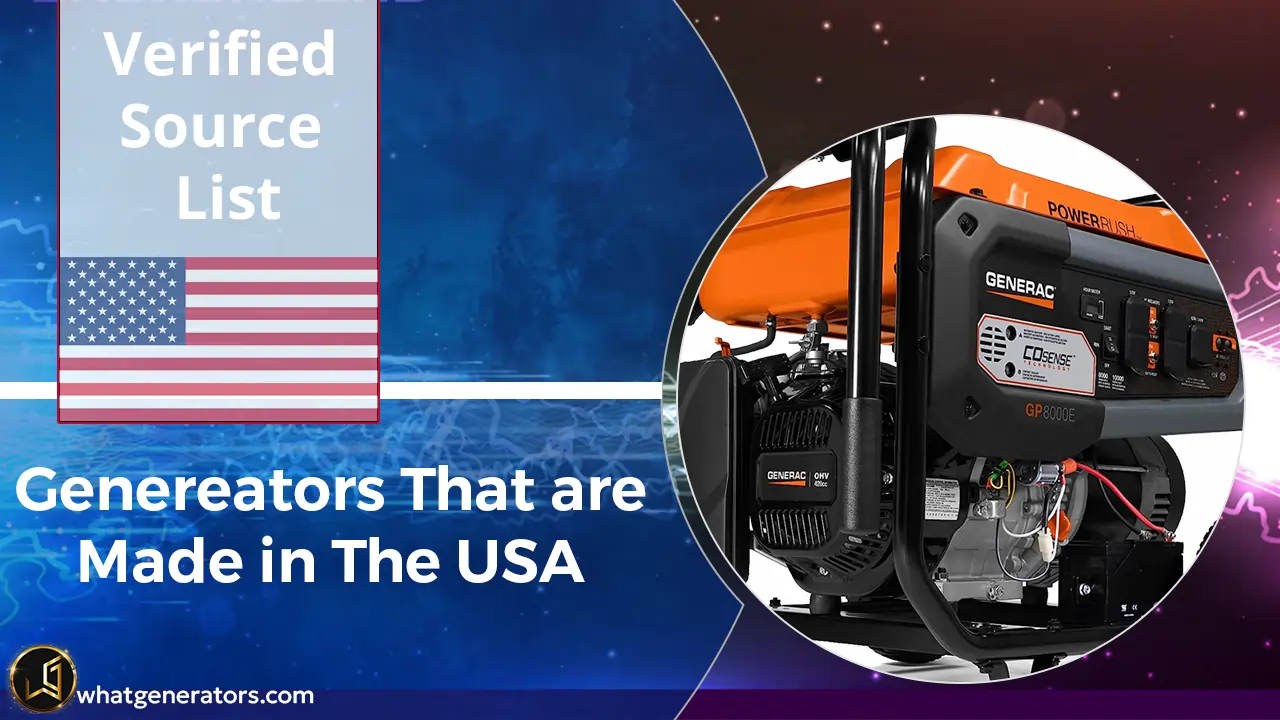
The generator plays a crucial role during light outages or in off-grid scenarios. However, encountering a generator overload with nothing plugged in can be frustrating. In this article, I will share my experience in understanding, preventing, and resolving generator overload issues.
In normal cases generator is overloading means that you have exceeded its rated load capacity, this issue can be resolved easily by just resetting the generator or reducing the load. However, if the problem persists, it may be caused by a more serious issue that requires professional attention.
In a case when there is no load connected to the generator and it overloads this can be caused by a faulty circuit breaker, short circuit, or Mechanical or electrical failures within the generator itself.
Symptoms of Generator Overload
One of the most common symptoms of generator overload is that it will stop powering whatever it is currently running and go into an overload situation. Engine overloading can be easily felt by the generator’s sound. A few more symptoms are given below.
- The cooling fan becomes extremely noisy.
- Humming or changing in sound patch is also a symptom of generator overload.
- produce smoke or spark from the vent.
- Tripp the circuit breaker or the generator going off.
- Overload light flashing.
- The generator shuts down while there is nothing plugged in.
You may try this easy fix: In 40% of cases, the generator can be recovered from overloading with just a quick reset. A generator can be easily reset by hitting the generator reset button and holding it for a few seconds or flipping a breaker.
Causes of Generator Overload Without Any Load
Generator overload is a situation where your generator is not able to handle the amount of power that is being demanded of it.
Jack Ryan
In some rare cases, generators can also overload empty, If your generator overloads when there are no appliances or devices plugged in. You may need to check the given cause carefully.
- A faulty voltage regulator.
- An overloaded circuit.
- A malfunctioning generator control unit.
- A Faulty Circuit Breaker.
- Generator Failure.
- Short circuit in the generator’s wiring.
If the voltage regulator is not functioning properly, it can cause the generator to produce too much voltage, leading to an overload. This can happen even when there are no appliances or devices plugged in. To fix this issue, the voltage regulator will need to be replaced.
An overloaded circuit can also cause the generator to overload, even when there are no appliances or devices plugged in. This can happen if there are too many circuits running at once or if the circuit is damaged. To fix this issue, you may need to reduce the number of circuits running or repair the damaged circuit.
A malfunctioning generator control unit can cause the generator to overload. This can happen if the control unit is not regulating the generator’s output properly. To fix this issue, the control unit will need to be repaired or replaced.
If a faulty circuit break is connected to the generator it can also put an overload on the generator without any load. This issue can be fixed by replacing the faulty circuit breaker.
A faulty or broken generator engine can also sound like overloading. In this case, you need to contact the service center or call an expert generator mechanic.
Overloading without load can also be caused by a short circuit in the wiring which is visible or not visible, in this case, you need to carefully check the whole wiring and ask an expert to fix the issue.
In summary, If you are experiencing this issue, it is best to consult a professional to determine the root cause and find the best solution.
What Happens When a Generator Overload With Nothing Plugged In?
Potential Damage to the Generator
When a generator is overloaded with nothing plugged in, it can still cause damage to the generator. The generator’s engine may overheat, and the sensor will read it, causing the generator to shut off immediately. Even if you start it after overheating, it will shut down as soon as you release the starter. An overloaded generator can also cause damage to the generator’s circuit breaker, which can lead to costly repairs.
Safety Concerns
An overloaded generator with nothing plugged in can also pose safety concerns. If the generator overheats and shuts off, it can create a fire hazard. Additionally, if the generator’s circuit breaker is damaged, it can cause electrical shock hazards. It is important to always follow the manufacturer’s instructions for your specific generator model to ensure safe operation.
In summary, even if nothing is plugged into a generator, it can still overload and cause damage to the generator and create safety concerns. It is important to monitor the generator’s running wattage and never exceed it for the sake of the safety and longevity of the generator.
How to Prevent Generator Overloading while using Nothing plugged in?
Proper Generator Sizing
One of the most important things to keep in mind when using a generator is to make sure that it is properly sized for the task at hand. If your generator is too small for the job, it will be overloaded and may even break down. On the other hand, if your generator is too large, it will be inefficient and may waste fuel.
When purchasing a generator, make sure to consider the wattage requirements of the appliances or tools that you will be using. You can find this information by checking the manufacturer’s specifications or by using a wattage calculator. Once you know the total wattage required, choose a generator that can handle at least that amount.
Using Automatic Voltage Regulation (AVR):
AVR is an important device for generators when it is not installed by default. This device controls the fluctuating voltage into a constant voltage level, a fluctuating voltage by the generator can cause heavy damage to your appliance especially sensitive electronic equipment.
Maintenance and Inspection of the generator if it overloads
If your generator is experiencing an overload even when there are no devices or appliances plugged in, it can be frustrating and worrisome. However, there are several steps you can take to identify the cause of the issue and resolve it. Here are some solutions to try:
- Check the Oil Level: The first thing you should do is check the oil level of your generator. Low oil levels can cause an overload as the engine struggles to function properly. Make sure the oil level is within the recommended range, and if not, add the necessary amount.
- Clean the Air Filter: A dirty air filter can also cause an overload as it restricts the airflow to the engine. Remove the air filter and clean it thoroughly or replace it if it’s damaged or worn out.
- Check the Spark Plug: The spark plug is responsible for igniting the fuel in the engine, and a faulty spark plug can cause an overload. Check the spark plug for any signs of wear or damage and replace it if necessary.
- Inspect the Fuel System: The fuel system of your generator should be clean and free of debris. Check the fuel tank for any contaminants, and clean or replace the fuel filter if necessary.
- Look for Loose Connections: Loose connections in the wiring or electrical system can cause an overload. Check all the connections, including the battery cables, and tighten them if they are loose.
- Reset the Circuit Breaker: If none of the above solutions work, try resetting the circuit breaker on your generator. Turn off the generator and unplug all the devices. Then, reset the circuit breaker and turn the generator back on.
If none of these steps resolve the overload issue, it’s best to contact a professional technician for further assistance. In any case, regular maintenance of your generator can prevent these kinds of problems from occurring in the first place. Always refer to the manufacturer’s instructions for proper care and maintenance of your generator.
Jack Ryan
If the Overload Light of the Generator is always On Or Flashing
If the overload light of your generator is always on or flashing, it could be an indication of a problem. One possible cause of this issue could be a faulty circuit breaker. If the circuit breaker is not working properly, it can cause the overload light to stay on or flash even when there is nothing plugged in. In this case, you may need to replace the circuit breaker to fix the problem.
Another possible cause of the overload light staying on or flashing could be an issue with the generator’s engine. If the engine is not running properly, it can cause the generator to overload, which will trigger the overload light. You may need to have the engine checked by a professional to determine the cause of the problem.
It is also possible that the overload light is staying on or flashing due to a problem with the generator’s voltage regulator. If the voltage regulator is not working properly, it can cause the generator to produce too much power, which can overload the system and trigger the overload light. In this case, you may need to have the voltage regulator replaced to fix the problem.
If you are experiencing this issue with your generator, it is important to address the problem as soon as possible to avoid any potential damage to the generator or other equipment. Contact a professional if you are unsure of how to fix the problem or if you need assistance in troubleshooting the issue.
Recommended Guide: Ryobi Generator Overload
Conclusion
After conducting extensive research and consulting various sources, I have concluded that generator overload with nothing plugged in can occur due to a variety of reasons. It is important to keep the generator in a well-ventilated area and unplug it when it is not in use to prevent overheating and potential overload. Additionally, it is crucial to ensure that the generator is not running without load for too long as this can cause the overload light to flash.
One of the easiest ways to fix an overloaded generator is to turn it into Eco mode. This will reduce the amount of power generated by the generator and allow it to run more efficiently. Resetting the inverter generator can also help solve the overload problem.
If the generator overload problem is occurring simply because it’s connected to an appliance whose rated wattage is more than the generator can handle, simply disconnect it from the generator. That will solve the issue. However, the generator overload light can be on due to other reasons as well.
To avoid generator overload with nothing plugged in, it is important to read the generator manual carefully and follow the manufacturer’s recommendations. Regular maintenance and inspection can also help prevent overload and prolong the life of the generator.
FAQ:
How do you stop a generator from overloading?
Unplug all appliances from the sockets and press the circuit protector reset button, followed by the Overload Reset button, to correct the load. The electricity will be restored right away. For each full start of the generator, the overload reset button can be pressed a maximum of five times.
What is an unbalanced load on the Generator?
An irregular load is a circumstance in which the three phases carry unequal currents. The net current is carried by neutral in this scenario. The loads in this example have disparate magnitudes and phase angles. This might result in power quality difficulties.
What are the signs of an overloaded generator?
Overloading of a generator A decrease in power output. When you see a decrease in power production from your generator, this is a clear indication of a generator overload. It begins to overheat. Have you heard any loud noises? … Soot is becoming visible in the exhaust.
What happens if you put too much load on a generator?
Overload. If the generator cannot deliver enough energy to its loads, it will not automatically shut down. It will overheat and maybe go out of work, both of which might threaten to harm your generator.
What controls the load on a generator?
The generator excitation system does this. The excitation system manages the magnetic field and checks the generator output to maintain the required voltage. It also controls your generator overload with nothing plugged in. As the load on the generator increases, so does the current flow, causing the voltage to fall.








Thanks Jack for the valuable information.
can you please help me with circuit tripping?
my generator circuit is tripping continuously please help.
Thanks bro here is you topic.
https://whatgenerators.com/generator-keeps-tripping/